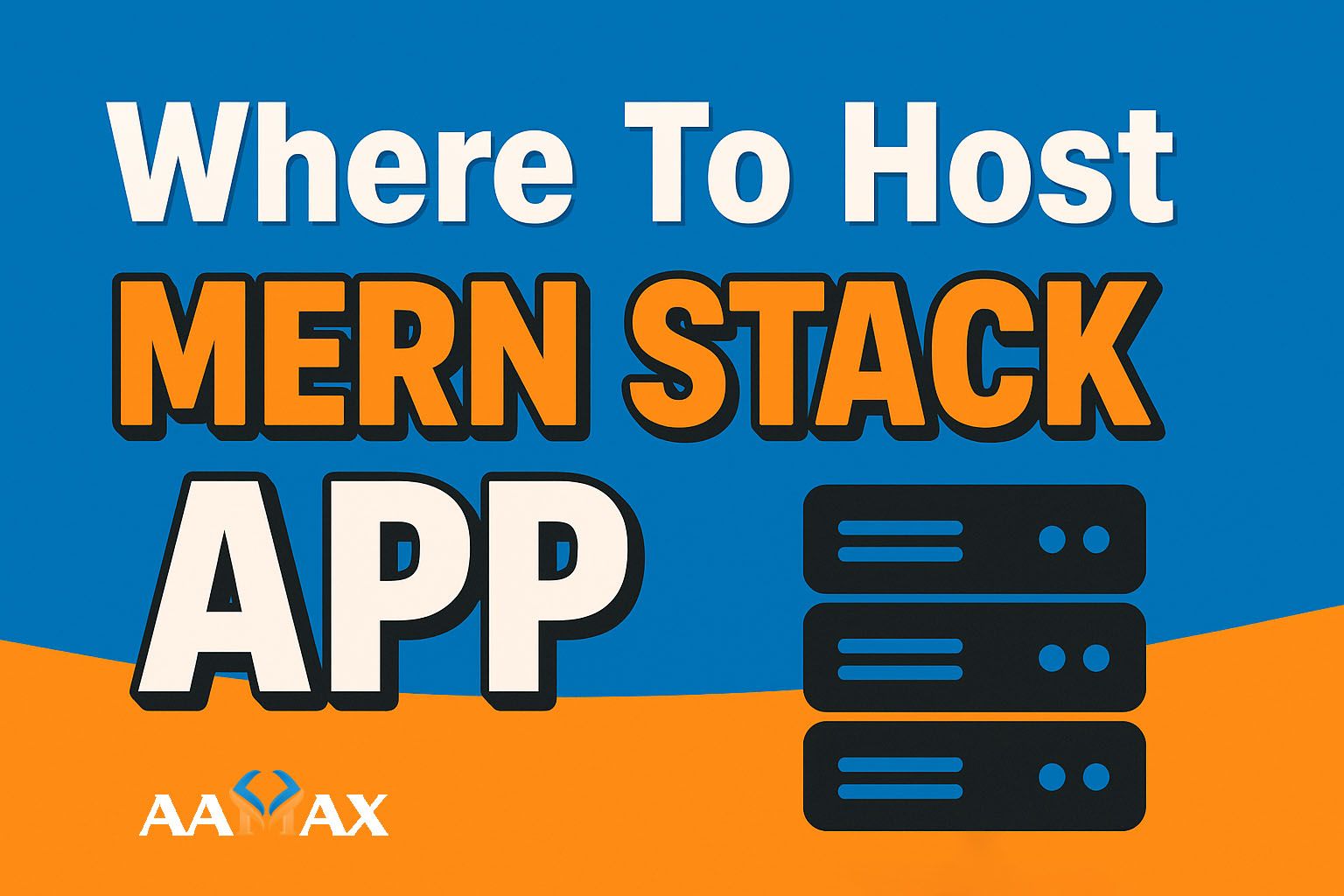
Where To Host MERN Stack App
Building a MERN Stack application is only half the battle --- the other half is finding the right hosting solution that ensures speed, scalability, and security. The MERN stack, consisting of MongoDB, Express.js, React.js, and Node.js, offers developers a powerful environment to create modern web applications. But where should you host your MERN stack app for optimal performance?
In this comprehensive guide, we'll explore the best hosting options, their advantages and drawbacks, deployment methods, and key factors to consider before making your final decision. By the end, you'll have a clear understanding of where and how to host your MERN Stack Development whether you're a solo developer, a startup, or an enterprise.
Understanding MERN Stack Hosting Requirements
Before diving into hosting platforms, it's important to understand the requirements of a MERN application. Each component of the stack has specific hosting needs:
- MongoDB -- Requires a database server with consistent uptime and scalability. Can be hosted on managed platforms like MongoDB Atlas.
- Express.js and Node.js -- Need a runtime environment with support for Node.js, preferably with load balancing and process management.
- React.js -- The frontend can be served as static files via a CDN or integrated within the Node.js app.
Hosting a MERN app typically involves deploying both the backend (Node/Express) and frontend (React), while connecting to a MongoDB database. The hosting provider you choose must support these technologies seamlessly.
Popular Hosting Platforms for MERN Stack Applications
Let's review some of the most popular and reliable hosting providers for MERN stack apps, along with their pros and cons.
1. Vercel
Vercel is a favorite among React developers for hosting frontend applications. It offers automatic builds, continuous deployment, and global CDN distribution.
Pros: - Ideal for static React frontends - Automatic GitHub/GitLab integration - Free tier for small projects - Built-in serverless functions
Cons: - Limited for large-scale Node.js backends - Requires additional setup for full MERN apps (backend hosting elsewhere)
Best For: React frontends with serverless functions.
2. Render
Render offers full-stack hosting with an easy setup process. It supports both Node.js servers and MongoDB connections, making it a great fit for MERN applications.
Pros: - Automatic deployments from Git - Free SSL, custom domains, and background workers - Simple configuration through render.yaml
Cons: - Limited free plan resources - May take time for initial build processes
Best For: Full MERN stack hosting with minimal setup.
3. Heroku
Heroku has been a go-to platform for developers for years, especially for Node.js applications. It provides an easy deployment process through Git and supports MongoDB via add-ons or external connections.
Pros: - Simple Git-based deployment - Easy integration with MongoDB Atlas - Scalable dynos for production apps
Cons: - Free tier discontinued for production use - Can get expensive as your app scales
Best For: Developers seeking simplicity and reliability in deployment.
4. AWS (Amazon Web Services)
AWS offers the most flexibility and scalability, though it requires more setup knowledge. Using services like EC2, Elastic Beanstalk, or AWS Amplify, you can host both your backend and frontend effectively.
Pros: - Highly customizable - Global infrastructure and load balancing - Auto-scaling and monitoring tools
Cons: - Complex setup process - Pay-as-you-go model can be costly for beginners
Best For: Enterprises or production-grade MERN apps with large traffic.
5. DigitalOcean
DigitalOcean's Droplets give developers full control of their environment. It's ideal for developers who prefer VPS-style hosting and want to configure servers manually.
Pros: - Affordable pricing - High performance with SSD storage - Great for developers comfortable with Linux
Cons: - Requires manual setup and maintenance - Limited managed database options
Best For: Developers wanting flexibility with cost-efficiency.
6. Netlify
Netlify is similar to Vercel and is perfect for deploying static frontends built with React. However, you'll need to host your backend elsewhere, such as on Render or AWS.
Pros: - Easy drag-and-drop deployment - Git-based CI/CD - Built-in serverless functions
Cons: - Backend hosting not supported - Limited customization
Best For: React frontends with separate backend APIs.
7. Google Cloud Platform (GCP)
Google Cloud provides an enterprise-level environment with services like App Engine, Cloud Run, and Compute Engine to host MERN apps.
Pros: - Robust performance - Scalable infrastructure - Integration with Firebase and BigQuery
Cons: - Steep learning curve - Complex pricing model
Best For: Developers and enterprises needing advanced scalability.
8. Microsoft Azure
Azure is another excellent option, particularly if your organization already uses Microsoft services. It offers App Services and VM hosting for Node.js applications.
Pros: - Strong enterprise integrations - Great for Node.js and MongoDB - Scalable with advanced DevOps tools
Cons: - Higher cost for smaller projects - Setup may be complex for beginners
Best For: Enterprise-grade MERN apps with Microsoft integration needs.
Factors to Consider When Choosing a Hosting Platform
When deciding where to host your MERN app, consider the following factors to make the best choice for your project's goals and budget:
- Scalability: Can the platform handle increased traffic?
- Ease of Deployment: How simple is it to deploy updates and new versions?
- Pricing: Does the pricing structure fit your project's needs?
- Performance: How fast will your app load globally?
- Support & Maintenance: Does the platform provide customer or community support?
- Security: Are SSL, backups, and data encryption supported?
Recommended Setup: A Balanced Approach
For most developers and startups, a hybrid approach works best:
- Frontend (React): Deploy on Vercel or Netlify for performance and ease of use.
- Backend (Express/Node): Host on Render or Heroku for simplicity and scalability.
- Database (MongoDB): Use MongoDB Atlas for a secure and managed experience.
This setup balances cost, performance, and reliability --- ensuring your MERN stack runs smoothly without overcomplicating infrastructure management.
Steps to Deploy a MERN Stack App
-
Build Your React Frontend: Use
npm run buildto generate production-ready static files. -
Host the Frontend: Upload to Vercel, Netlify, or your chosen static hosting service.
-
Deploy Backend API: Push your backend code to a service like Render or Heroku.
-
Connect MongoDB: Use MongoDB Atlas or a self-hosted MongoDB instance.
-
Set Environment Variables: Store secrets like API keys, database URLs, and JWT tokens securely.
-
Configure Domain and SSL: Point your custom domain and enable HTTPS for security.
-
Monitor and Maintain: Use tools like UptimeRobot, LogRocket, or AWS CloudWatch to track performance.
Why Choose AAMAX for MERN Stack Development
If you're planning to build or host a MERN stack application, AAMAX is your trusted partner. As a full-service digital marketing and web development company, AAMAX offers comprehensive MERN Stack Development, Web Development, Digital Marketing, and SEO services.
Here's why AAMAX stands out:
- Experienced Developers: Skilled in full-stack JavaScript development.
- Scalable Solutions: Applications designed for performance and growth.
- End-to-End Support: From concept to deployment and maintenance.
- SEO & Marketing Integration: Ensuring your app performs well in search results.
- Affordable Pricing: Flexible packages for startups and enterprises alike.
With AAMAX, you don't just get a development team --- you get a long-term technology partner who understands how to turn your idea into a scalable digital product.
Final Thoughts
Choosing where to host your MERN stack app depends on your project requirements, budget, and technical expertise. For small to mid-sized projects, platforms like Render and Vercel offer simplicity and affordability. For larger, production-grade applications, AWS, GCP, or Azure provide unmatched scalability and reliability.
Regardless of the platform, always focus on security, performance, and scalability --- these three factors will ensure your app succeeds in the long term.
If you need professional help developing or deploying your MERN stack app, AAMAX is here to help you every step of the way.







